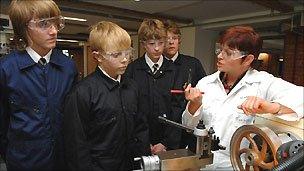Baccalaureate league table plan angers heads
- Published

Heads say vocational education will be sidelined
Head teachers say the inclusion of the new "English baccalaureate" in this year's league tables is unfair.
When England's secondary school league tables are published on Wednesday, they will include the new measure.
The tables will show what proportion of a school's pupils got at least a C in English, maths, science, a language and either geography or history at GCSE.
Education Secretary Michael Gove says this will show which schools give pupils a core academic knowledge.
He believes some schools boosted their league table positions in the past by entering students for "softer" subjects and vocational qualifications.
Head teachers say it is unfair to bring in the measure so quickly and before a planned shake-up of the curriculum goes ahead.
'Retrospective measure'
Schools will also still be measured against the existing key target of the percentage of pupils achieving five good GCSE passes including maths and English.
Brian Lightman, general secretary of the Association of School and College Leaders (ASCL) said: "This is simply a retrospective indicator. The government will say it is a starting point but levels will be low.
"It's an indicator over which schools have no control as it was not in place when the children concerned studied for their exams.
"This is going to disadvantage schools in poorer areas. This is a very academic qualification."
Education Secretary Michael Gove told BBC News that parents would welcome the new measure.
"It shines a light on what is happening in schools," he said.
"The English Baccalaureate does not force anyone to do anything but it does reveal the extent to which in the last 13 years we have seen a huge drop in the numbers of students doing modern languages, and overall that the number of students who have got GCSEs in English, maths, a foreign language, science and a humanity is not what it should be."
Under Labour, schools were told they no longer had to teach modern languages to children after the age of 14.
ASCL's Brian Lightman said: "We are in favour of a broad curriculum and for as many pupils as possible to get into the best universities - but education is not just about university entrance.
"This will devalue vocational education and marginalise it."
Mr Gove disputes that, saying there will be "more and better vocational paths", including the new university technology colleges, which will take pupils from the age of 14.
Moving goal posts
Some schools have already begun changing their curriculum to fall in step with the new measure.
Among them is Woodside High School in north London.
Head teacher Joan McVittie says the school was "the worst in London" when she was recruited to turn it around a few years ago.
It has improved markedly, but will get a very low ranking on the new measure.
"This is a major issue for us. We will be lucky to get three or four per cent [of pupils credited with achieving the English Bacc]," she said.
"We have already started to make changes because they have moved the goalposts. We want to continue to be seen as an improving school. But it will be hard on our children."
More than 80% of pupils at the school speak English as a second language.
"We struggle to make sure they are up to speed in English. For some of our children, the less demanding vocational route is the best option," Mrs McVittie said.
"We have been moving towards this more academic curriculum and if I was a head in a leafy area with English-speaking children, I would be following this type of curriculum. We built a curriculum which allows my children to achieve success."
- Published22 November 2010
- Published17 November 2010
- Published24 November 2010
- Published24 November 2010
- Published9 September 2010